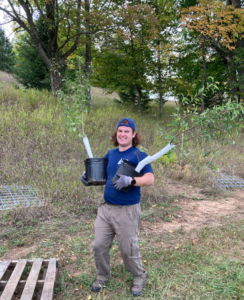2021-2022 Huron Pines AmeriCorps Program Positions are Open
The 2021-2022 Huron Pines AmeriCorps(HPA) positions have been posted, and Michigan United Conservation Clubs(MUCC) will once again be a host site.
If you are unfamiliar, “The Huron Pines AmeriCorps program has been developing leaders in conservation in communities across Michigan since 2007. Huron Pines AmeriCorps members strive to enhance Michigan’s natural resources and foster environmental stewardship by engaging local volunteers, community groups and schools in service projects, hands-on learning opportunities and educational workshops.”
The Huron Pines AmeriCorps program is a great stepping stone for those looking for an opportunity to start their career in conservation. These ten-month terms of service will begin in January of 2022 and end in November of 2022.
MUCC is looking for a candidate who is passionate about uniting Michiganders for conservation. The 2021-2022 HPA member with MUCC will work on projects to protect public land, improve terrestrial and aquatic habitat for wildlife and help teach future conservation leaders through education and outreach events.
It has been my good fortune to serve with the HPA program and MUCC since February 3rd of 2020. In the past 18 months, I have gained a better understanding and appreciation for conservation efforts in Michigan, seen parts of Michigan I never knew about previously and gained valuable skills and technical knowledge that will serve me well into my future career.

The most recent service project I’ve participated in included planting 80 mature and mast-producing trees in the Escanaba River State Forest.
It is common in job interviews for a candidate to ask, “With this job, what does a typical day look like?” When that question has been asked of me, I’ve been happy to reply that there is no typical day of AmeriCorps service with HPA or MUCC. My service has taken me across Michigan from the Escanaba River State Forest in the Western Upper Peninsula to the Petersburg State Game Area in the Oak Openings region of Southeast Michigan. I’ve spent days of service removing trash from public land and days of service working on a Leave-No-Trace Curriculum to teach children at MUCC’s youth camp. My favorite part of service has been working with the fantastic volunteers that come out to participate in MUCC’s habitat events. It has been a joy to hear their stories and personal connections with the land while we plant trees and build brush piles side-by-side. Through the HPA program, I have also learned much more about the work and reach of other host site organizations such as the Michigan Department of Natural Resources, US Forest Service, US Fish and Wildlife Service, Conservation Districts, Land Conservancies and other environmental non-profits.
If you are reading this and know of any recent college graduates or young folks looking to start their conservation journey, please share these positions with them. Click here to view the MUCC Outreach Coordinator position description as well as all of the other open HPA positions.
My term of service will end this November, and I am looking forward to the remainder of my AmeriCorps service with Huron Pines and MUCC. There is plenty of conservation work and projects to be done over the next couple of months, and I am excited to serve with the MUCC staff to get things done!
The post 2021-2022 Huron Pines AmeriCorps Program Positions are Open appeared first on Michigan United Conservation Clubs.
Recent Posts



